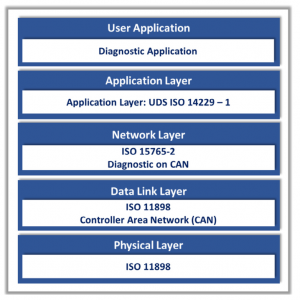- Products
- Automotive
- Avionics
COTS Module
- Agilex 7 SmartNIC Card
- Zynq RFSoC ADC DAC PCIe Card
- ZU7/ZU5/ZU4 PCIe SmartNIC Card
- ZU19/17/11 PCIe SmartNIC Card
- PCIe Switch Module
- PCIe to SD 3.0 M.2 Module
- Kintex-7 PCIe Card
- Zynq ZU7/ZU5/ZU4 3U-VPX
- Virtex UltraScale+ 3U VPX
- Kintex UltraScale+ 3U VPX
- Zynq ZU19/17/11 3U VPX
- Kintex-7 3U VPX Card
- VITA 57.4 FMC+ Loopback Test Module
- VITA 57.1 FMC Loopback Test Module
- PCIe Gen4 x8 FMC Module
- PCIe Gen4 x16 FMC+ Module
- PCIe Gen3 x8 FMC Module
- Quad QSFP28 FMC+ Module
- FMC Add-On Cards
- IP Cores
- ODM Solutions
- Custom Design
- Company


Get a Quote
Please fill in the form and we will get back to you soon!
We appreciate you contacting iWave.
Our representative will get in touch with you soon!

Get in Touch
We appreciate you contacting iWave.
Our representative will get in touch with you soon!
Thank you for subscribing to our newsletter!
Case Study: UDS Protocol Stack enabling Diagnostics in EVs
The rapid rollout of electric vehicles (EVs) is accelerating the industry to adopt new technologies to make them more efficient and sustainable. They demand advanced diagnostic tools for managing and controlling the various components and ECUs in a vehicle. And with the requirement to ensure inter-operability between various suppliers and the individual components.
The UDS (Unified Diagnostic Services) protocol is defined in the ISO 14229 series and is a protocol that lets diagnostic systems communicate with the ECUs, to help diagnose faults and re-program the ECUs. The UDS protocol uses fifth (session layer) and seventh (application layer) layer of the OSI model while the CAN protocol works on the first (physical layer – ISO 11898- 2) and second (data link layer – ISO 11898-2) layer of the OSI model.
Recently, iWave delivered UDS stack to couple of Automotive customers in India, including an electric 2-wheeler manufacturer, with the requirement for a ready to deploy UDS Protocol Stack, helping them speed up their product development cycle with reduced risk. They required the UDS Client Stack & Server Stack to be ported on an i.MX RT based Telematics Control Unit and UDS Server to be ported on an S32K based ECU. iWave supported the customer with the production ready and tested UDS Protocol Stack and complete supporting on the porting and integrated with the tester and ECU platforms.
Challenges
- UDS Client and Server Stack with all 26 Services
- FreeRTOS Compatible
- Source Code Sharing
- CAN 2.0 and CAN-FD Compatible
- Porting help on the i.MX RT and S32K
- Ready to deploy and tested solution
The UDS Stack enables various use cases for Automotive OEMs:
- Enabled Reading & clearing of diagnostic trouble codes (DTC) for troubleshooting vehicle issues
- Extracting parameter data values such as temperatures, state of charge, VIN etc.
- Initiate diagnostic sessions; for example to test safety-critical features
- Modify ECU behavior via resets, firmware flashing and settings modification
UDS communication takes place in a client-server topology, with the client being a tester tool and the server being a vehicle ECU. Messages exchanged between the client and the server, are represented by a Request and a Response. The client sends Requests to the server that include a Service ID, an optional subfunction, and some data. The server processes the request and responds with a Positive or a Negative Response based on the service supported.
The data transmission capabilities of a UDS Protocol Stack enable the clients to read or write any information to or from the ECU. The UDS Stack definitely is a promising solution for vehicle diagnostics, especially since it is independent of the medium, which may be CAN, FlexRay, K-Line or Ethernet.
Complementing an extensive portfolio of Telematic Control Units and Gateways, iWave enables customers with automotive protocol stacks enabling customers in their development journey.
For more details on the telematics solutions at iWave, contact us at mktg@iwavesystems.com
Keep reading
iWave is an embedded systems engineering and solutions company, designing solutions for the Industrial, Medical, Automotive and Avionics vertical markets, and building on our core competency of embedded expertise since 1999. Read More…
Newsletter
Copyright © 2022 iWave Systems Technologies Pvt. Ltd.





